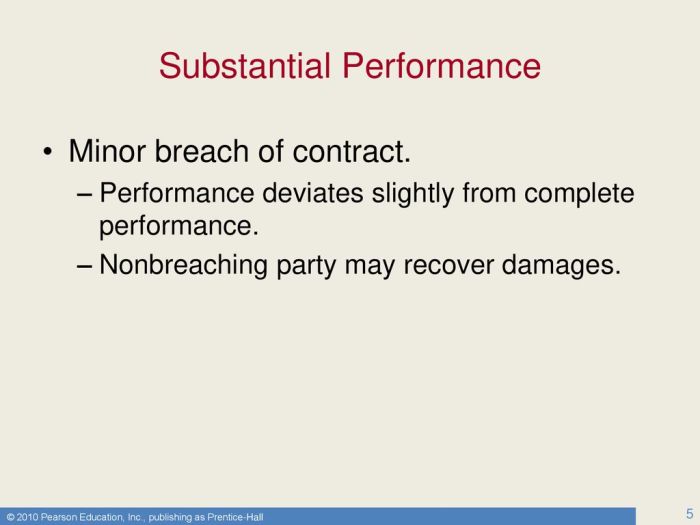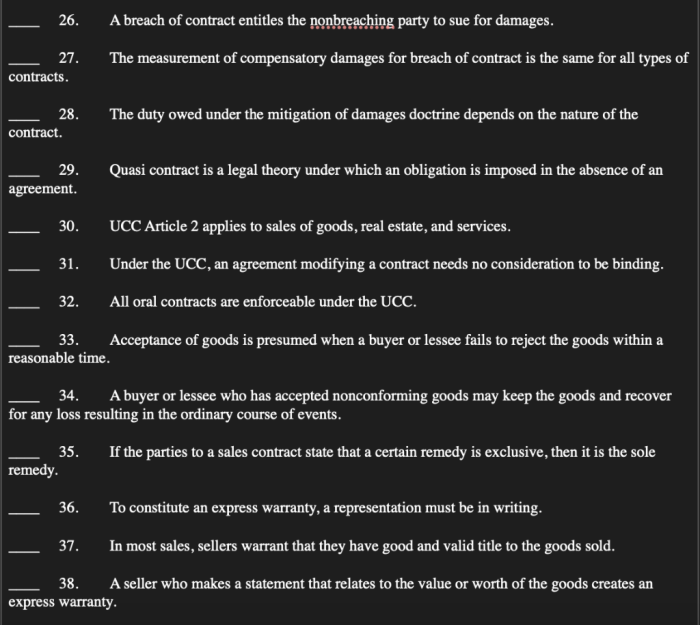Any breach discharges the nonbreaching party from the contract, setting the stage for an in-depth exploration of the topic. This principle forms the cornerstone of contract law, with far-reaching implications for both parties involved. As we delve into the intricacies of this legal concept, we will uncover its impact on contractual obligations, exceptions to the rule, remedies for breach, mitigation of damages, and strategies for preventing breaches.
The concept of breach of contract is a fundamental principle that governs the enforcement of agreements. When one party fails to fulfill their contractual obligations, it triggers a series of legal consequences. Understanding the nuances of breach of contract is crucial for businesses and individuals alike, as it can have significant financial and legal implications.
Impact on Contractual Obligations

A breach of contract occurs when one party fails to fulfill their obligations as agreed upon in the contract. The non-breaching party is then discharged from their own obligations under the contract. This means that they are no longer required to perform their part of the agreement.
There are several ways in which a breach can lead to the termination of a contract. First, if the breach is material, it may render the contract impossible to perform. For example, if a construction company fails to deliver the promised materials on time, the homeowner may be unable to complete the construction project.
In such cases, the homeowner would be justified in terminating the contract.
Second, a breach may also lead to the termination of a contract if it causes the non-breaching party to lose confidence in the other party’s ability to perform. For example, if a software company repeatedly fails to meet deadlines, the client may lose confidence in the company’s ability to deliver a quality product.
In such cases, the client would be justified in terminating the contract.
The legal consequences of a breach of contract can be significant. The non-breaching party may be entitled to damages, specific performance, or an injunction. Damages are a monetary award that compensates the non-breaching party for the losses they have suffered as a result of the breach.
Specific performance is a court order that requires the breaching party to fulfill their obligations under the contract. An injunction is a court order that prevents the breaching party from continuing to breach the contract.
Exceptions to the Rule: Any Breach Discharges The Nonbreaching Party From The Contract

There are a few exceptions to the rule that any breach discharges the non-breaching party from their contractual obligations. First, the non-breaching party may waive their right to terminate the contract. This can be done either expressly or impliedly. For example, if the non-breaching party continues to perform their obligations under the contract after the breach, they may be deemed to have waived their right to terminate.
Second, the breach may be minor. A minor breach is a breach that does not materially affect the performance of the contract. In such cases, the non-breaching party may not be justified in terminating the contract.
Finally, the non-breaching party may be estopped from terminating the contract. Estoppel is a legal doctrine that prevents a party from asserting a right that they have previously waived or abandoned. For example, if the non-breaching party has previously accepted late performance from the breaching party, they may be estopped from terminating the contract for a subsequent late performance.
Remedies for Breach
The non-breaching party has several remedies available to them in the event of a breach of contract. The most common remedy is damages. Damages are a monetary award that compensates the non-breaching party for the losses they have suffered as a result of the breach.
Another remedy available to the non-breaching party is specific performance. Specific performance is a court order that requires the breaching party to fulfill their obligations under the contract. This remedy is only available if the contract is for the sale of unique goods or if the non-breaching party has a special interest in the performance of the contract.
Finally, the non-breaching party may also be entitled to an injunction. An injunction is a court order that prevents the breaching party from continuing to breach the contract. This remedy is only available if the breach is causing irreparable harm to the non-breaching party.
The court will consider several factors when determining the appropriate remedy for a breach of contract. These factors include the nature of the breach, the severity of the breach, and the availability of other remedies.
Mitigation of Damages
The non-breaching party has a duty to mitigate their damages. This means that they must take reasonable steps to minimize the losses they suffer as a result of the breach. For example, if a construction company fails to deliver the promised materials on time, the homeowner should make reasonable efforts to find a replacement supplier.
The failure to mitigate damages can reduce the amount of damages that the non-breaching party is entitled to recover. In some cases, the failure to mitigate damages may even bar the non-breaching party from recovering any damages at all.
Prevention of Breaches

There are several steps that parties can take to prevent breaches of contract. First, the parties should clearly communicate their expectations and obligations under the contract. Second, the parties should carefully consider the risks involved in the contract and take steps to mitigate those risks.
Finally, the parties should establish a dispute resolution mechanism to resolve any disputes that may arise.
By taking these steps, the parties can help to prevent breaches of contract and protect their rights under the contract.
FAQ Guide
What is the significance of the principle “any breach discharges the nonbreaching party from the contract”?
This principle underscores the importance of fulfilling contractual obligations and the legal consequences of failing to do so. It protects the nonbreaching party from being bound to a contract where the other party has breached their obligations.
Are there any exceptions to this rule?
Yes, there are exceptions to the rule. For instance, the breach may be considered immaterial, the nonbreaching party may have waived their right to terminate the contract, or the contract may include a provision that limits the right to terminate for certain types of breaches.
What remedies are available to the nonbreaching party in the event of a breach?
The nonbreaching party may have several remedies available, including damages, specific performance, and injunctions. The appropriate remedy will depend on the nature of the breach and the specific circumstances of the case.